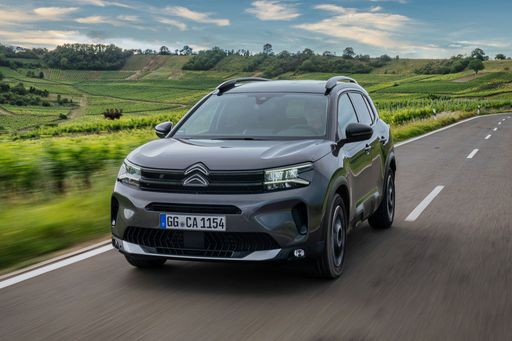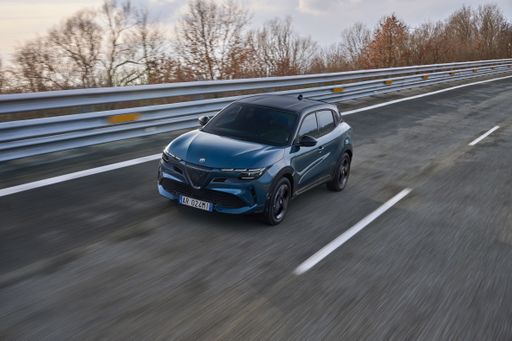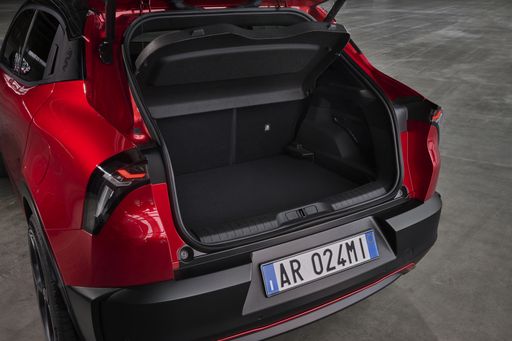Alfa Romeo Junior vs Citroen C5 Aircross – Which model is better for everyday use?
Two cars, one duel: Alfa Romeo Junior meets Citroen C5 Aircross.
Which one wins in performance, efficiency and value for money? Find out now!
Costs and Efficiency:
When it comes to price and running costs, the biggest differences usually appear. This is often where you see which car fits your budget better in the long run.
Alfa Romeo Junior has a somewhat advantage in terms of price – it starts at 25700 £, while the Citroen C5 Aircross costs 29100 £. That’s a price difference of around 3463 £.
Fuel consumption also shows a difference: Citroen C5 Aircross manages with 2.50 L and is therefore clearly more efficient than the Alfa Romeo Junior with 4.80 L. The difference is about 2.30 L per 100 km.
In terms of energy consumption, the advantage goes to the Alfa Romeo Junior: with 15.10 kWh per 100 km, it’s slightly more efficient than the Citroen C5 Aircross with 17 kWh. That’s a difference of about 1.90 kWh.
As for range, the Citroen C5 Aircross performs distinct better – achieving up to 520 km, about 110 km more than the Alfa Romeo Junior.
Engine and Performance:
Power, torque and acceleration say a lot about how a car feels on the road. This is where you see which model delivers more driving dynamics.
When it comes to engine power, the Alfa Romeo Junior has a distinct edge – offering 280 HP compared to 210 HP. That’s roughly 70 HP more horsepower.
In acceleration from 0 to 100 km/h, the Alfa Romeo Junior is decisively quicker – completing the sprint in 5.90 s, while the Citroen C5 Aircross takes 8.30 s. That’s about 2.40 s faster.
In terms of top speed, the Citroen C5 Aircross performs slight better – reaching 220 km/h, while the Alfa Romeo Junior tops out at 206 km/h. The difference is around 14 km/h.
There’s also a difference in torque: Alfa Romeo Junior pulls somewhat stronger with 345 Nm compared to 300 Nm. That’s about 45 Nm difference.
Space and Everyday Use:
Cabin size, boot volume and payload all play a role in everyday practicality. Here, comfort and flexibility make the difference.
Both vehicles offer seating for 5 people.
In curb weight, Alfa Romeo Junior is to a small extent lighter – 1380 kg compared to 1629 kg. The difference is around 249 kg.
In terms of boot space, the Citroen C5 Aircross offers distinct more room – 565 L compared to 415 L. That’s a difference of about 150 L.
In maximum load capacity, the Citroen C5 Aircross performs clearly perceptible better – up to 1668 L, which is about 388 L more than the Alfa Romeo Junior.
When it comes to payload, Citroen C5 Aircross slightly takes the win – 471 kg compared to 420 kg. That’s a difference of about 51 kg.
Who comes out on top?
Overall, the Citroen C5 Aircross shows itself to be outperforms in nearly all aspects and secures the title of DriveDuel Champion.
It convinces with the more balanced overall package and proves to be the more versatile choice for everyday use.
 @ Citroën / Stellantis Media
@ Citroën / Stellantis Media
Citroen C5 Aircross
Alfa Romeo Junior
The Alfa Romeo Junior captures the essence of Italian design with its sleek lines and compact dimensions, making it an icon of elegance and performance. With a spirited driving experience and a charming retro aesthetic, it appeals to enthusiasts and casual drivers alike. This delightful car embodies the brand's rich heritage while remaining a fun and engaging option for those seeking a unique automotive experience.
details @ Alfa Romeo / Stellantis Media
@ Alfa Romeo / Stellantis Media
 @ Alfa Romeo / Stellantis Media
@ Alfa Romeo / Stellantis Media
 @ Alfa Romeo / Stellantis Media
@ Alfa Romeo / Stellantis Media
Citroen C5 Aircross
The Citroen C5 Aircross stands out in the SUV market with its distinctively bold design and emphasis on comfort. Its interior is thoughtfully crafted, providing spaciousness and a plethora of features that cater to passenger convenience and enjoyment. With its smooth ride and refined driving dynamics, it offers a relaxing experience for both city commutes and long-distance journeys.
details @ Citroën / Stellantis Media
@ Citroën / Stellantis Media
 @ Citroën / Stellantis Media
@ Citroën / Stellantis Media
 @ Citroën / Stellantis Media
@ Citroën / Stellantis Media
 @ Citroën / Stellantis Media
@ Citroën / Stellantis Media
 @ Alfa Romeo / Stellantis Media
@ Alfa Romeo / Stellantis Media
|
 @ Citroën / Stellantis Media
@ Citroën / Stellantis Media
|
|
|
|
Costs and Consumption |
|
|---|---|
|
Price
25700 - 41600 £
|
Price
29100 - 41600 £
|
|
Consumption L/100km
4.8 - 5.4 L
|
Consumption L/100km
2.5 - 5.4 L
|
|
Consumption kWh/100km
15.1 - 17.5 kWh
|
Consumption kWh/100km
17 kWh
|
|
Electric Range
344 - 410 km
|
Electric Range
81 - 520 km
|
|
Battery Capacity
0.4 - 51 kWh
|
Battery Capacity
17.8 - 73 kWh
|
|
co2
0 - 119 g/km
|
co2
0 - 121 g/km
|
|
Fuel tank capacity
44 - 45 L
|
Fuel tank capacity
55 L
|
Dimensions and Body |
|
|---|---|
|
Body Type
SUV
|
Body Type
SUV
|
|
Seats
5
|
Seats
5
|
|
Doors
5
|
Doors
5
|
|
Curb weight
1380 - 1689 kg
|
Curb weight
1629 - 2184 kg
|
|
Trunk capacity
340 - 415 L
|
Trunk capacity
565 L
|
|
Length
4173 mm
|
Length
4650 mm
|
|
Width
1781 mm
|
Width
1870 mm
|
|
Height
1505 - 1538 mm
|
Height
1695 mm
|
|
Max trunk capacity
1205 - 1280 L
|
Max trunk capacity
1668 L
|
|
Payload
390 - 420 kg
|
Payload
446 - 471 kg
|
Engine and Performance |
|
|---|---|
|
Engine Type
Electric, Petrol MHEV
|
Engine Type
Petrol MHEV, Electric, Plugin Hybrid
|
|
Transmission
Automatic
|
Transmission
Automatic
|
|
Transmission Detail
Dual-Clutch Automatic, Reduction Gearbox
|
Transmission Detail
Dual-Clutch Automatic, Reduction Gearbox
|
|
Drive Type
Front-Wheel Drive, All-Wheel Drive
|
Drive Type
Front-Wheel Drive
|
|
Power HP
136 - 280 HP
|
Power HP
145 - 210 HP
|
|
Acceleration 0-100km/h
5.9 - 9.1 s
|
Acceleration 0-100km/h
8.3 - 11.2 s
|
|
Max Speed
150 - 206 km/h
|
Max Speed
170 - 220 km/h
|
|
Torque
230 - 345 Nm
|
Torque
230 - 300 Nm
|
|
Number of Cylinders
3
|
Number of Cylinders
3 - 4
|
|
Power kW
100 - 207 kW
|
Power kW
107 - 157 kW
|
|
Engine capacity
1199 cm3
|
Engine capacity
1199 - 1598 cm3
|
General |
|
|---|---|
|
Model Year
2024 - 2025
|
Model Year
2025
|
|
CO2 Efficiency Class
A, C, D
|
CO2 Efficiency Class
D, A, B
|
|
Brand
Alfa Romeo
|
Brand
Citroen
|
What drive types are available for the Alfa Romeo Junior?
Available configurations include Front-Wheel Drive or All-Wheel Drive.
The prices and data displayed are estimates based on German list prices and may vary by country. This information is not legally binding.
